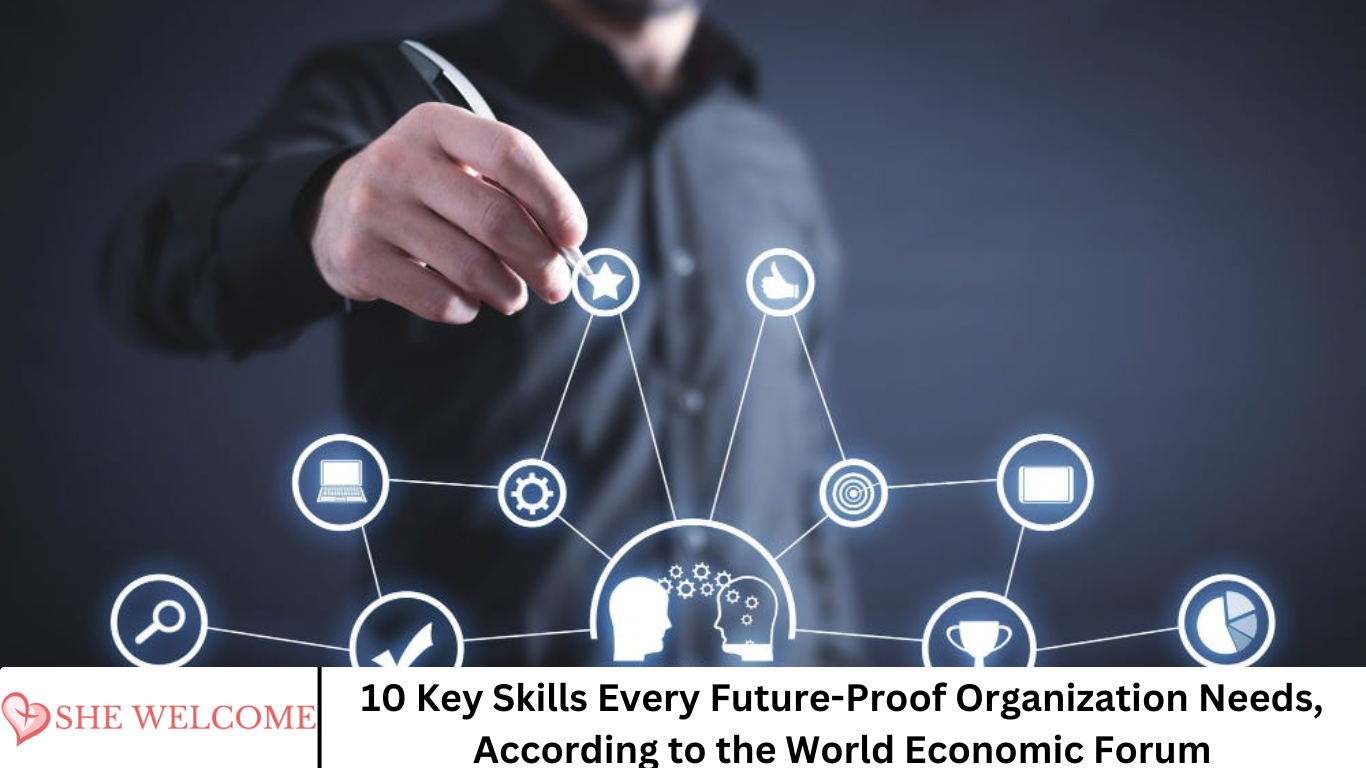In a rapidly evolving global economy, the ability to adapt is no longer optional—it’s a necessity. The World Economic Forum (WEF), through its biannual “Future of Jobs” report, provides critical insights into the skills that will define the workforce of tomorrow.
The 2020 report highlights a transformative shift in the labor market, driven by advances in automation, artificial intelligence, and digital technologies. According to the WEF, by 2025, half of all employees will need reskilling. Organizations that want to remain competitive and resilient must focus on cultivating key future-ready skills.
We will delve into the 10 key skills that every future-proof organization needs, based on the World Economic Forum’s research. We’ll explore why these skills are essential, how they align with broader industry trends, and actionable steps companies can take to integrate them into their workforce development strategies.
More Read: Comparing Online and Traditional Learning: What Sets Them Apart
1. Analytical Thinking and Innovation
As automation continues to handle routine tasks, human roles are increasingly focused on problem-solving and innovation. Analytical thinking involves the ability to interpret data, identify patterns, and make reasoned decisions. Innovation complements this by fostering creative approaches to solving complex challenges.
Why it matters: Organizations need analytical thinkers to make data-driven decisions and innovate continuously to stay ahead of the competition.
Actionable tip: Encourage a culture of experimentation and critical thinking by integrating data analytics tools and offering regular innovation workshops.
2. Active Learning and Learning Strategies
The half-life of skills is shrinking, meaning that continuous learning is no longer a luxury but a requirement. Active learning refers to self-directed, engaging learning experiences that help employees acquire and apply new knowledge effectively.
Why it matters: Companies that prioritize upskilling and reskilling are better equipped to pivot quickly in response to market changes.
Actionable tip: Invest in personalized learning platforms and promote a growth mindset across all levels of the organization.
3. Complex Problem Solving
Today’s business environment is filled with uncertainty and complexity. Complex problem solving involves the ability to identify intricate issues and design effective solutions.
Why it matters: It enables teams to tackle multifaceted challenges, from supply chain disruptions to digital transformation.
Actionable tip: Use real-world case studies in training programs to develop employees’ critical thinking and strategic decision-making skills.
4. Critical Thinking and Analysis
Critical thinking involves objectively evaluating information to form a judgment. It is essential for strategic planning, risk assessment, and decision-making.
Why it matters: In an era of misinformation and rapid change, critical thinking helps ensure decisions are based on solid evidence and logic.
Actionable tip: Incorporate scenario planning and decision-making simulations into employee development initiatives.
5. Creativity, Originality, and Initiative
Creativity isn’t limited to artists. It encompasses the ability to generate new ideas, approaches, and solutions in any field. Originality and initiative mean not just thinking differently but acting on those thoughts.
Why it matters: Organizations that nurture creativity are better positioned to innovate and differentiate themselves in saturated markets.
Actionable tip: Create cross-functional teams and dedicate time for “innovation sprints” to spark creative thinking.
6. Leadership and Social Influence
Effective leadership involves inspiring others, making ethical decisions, and influencing outcomes positively. Social influence is increasingly important in remote and hybrid work environments where interpersonal dynamics can be complex.
Why it matters: Strong leadership fosters employee engagement, trust, and alignment with organizational goals.
Actionable tip: Develop leadership pipelines through mentoring programs and emotional intelligence training.
7. Technology Use, Monitoring, and Control
Understanding and managing emerging technologies is critical for operational efficiency and competitiveness. This includes everything from AI and machine learning to IoT and cloud computing.
Why it matters: Technology is reshaping industries, and organizations that fail to adapt risk falling behind.
Actionable tip: Conduct regular tech audits and provide role-specific digital literacy training.
8. Technology Design and Programming
Beyond just using technology, designing and developing digital tools and platforms is increasingly valuable. This skill is crucial for creating customized solutions tailored to specific business needs.
Why it matters: In-house tech capabilities can accelerate digital transformation and reduce dependency on external vendors.
Actionable tip: Support employee participation in coding bootcamps and collaborative tech-building projects.
9. Resilience, Stress Tolerance, and Flexibility
Change is inevitable. Employees who can handle stress, adapt to shifting circumstances, and bounce back from setbacks are invaluable.
Why it matters: A resilient workforce can maintain productivity and morale, even during crises or transitions.
Actionable tip: Offer well-being programs, flexible work arrangements, and training on stress management techniques.
10. Reasoning, Problem-Solving, and Ideation
This meta-skill combines logic, creativity, and strategic thinking to develop new ideas and solutions. It complements many of the other skills on this list.
Why it matters: The ability to connect dots, generate ideas, and reason through uncertainty is critical in a dynamic workplace.
Actionable tip: Encourage design thinking practices and include ideation sessions in project planning phases.
Why These Skills Matter More Than Ever
The Fourth Industrial Revolution is redefining work as we know it. With AI, robotics, and big data transforming industries, soft skills like creativity and resilience are becoming just as important as technical know-how. According to the WEF, businesses that invest in future-proofing their workforce can expect increased productivity, improved employee retention, and stronger organizational agility.
Moreover, reskilling isn’t just a business imperative—it’s a societal one. Governments, educational institutions, and private organizations all have a role to play in equipping people for the jobs of tomorrow. The Reskilling Revolution, a WEF initiative, aims to provide better education, skills, and jobs to a billion people by 2030.
How Organizations Can Prepare
- Conduct Skills Audits: Regularly assess your workforce to identify skill gaps and development needs.
- Invest in Learning and Development: Allocate resources to training programs that focus on both technical and soft skills.
- Foster a Culture of Lifelong Learning: Encourage continuous improvement and recognize learning as a key performance indicator.
- Leverage Technology: Use digital platforms to personalize learning and track progress.
- Build Partnerships: Collaborate with educational institutions and industry bodies to stay ahead of emerging trends.
Frequently Asked Question
What are the top 10 skills identified by the World Economic Forum for 2025?
The World Economic Forum highlights key future skills including analytical thinking, active learning, complex problem solving, critical thinking, creativity, leadership, tech literacy, tech design, resilience, and ideation. These are essential for organizations aiming to remain competitive in a fast-changing labor market.
Why are future-ready skills important for organizations?
Future-ready skills help organizations stay agile, competitive, and innovative in the face of digital disruption, automation, and evolving business models. Investing in these skills enhances workforce adaptability and long-term success.
How can companies implement these future skills in the workplace?
Companies can integrate these skills through continuous learning initiatives, leadership development programs, digital upskilling, and a culture that supports innovation and resilience. Tools like learning platforms and cross-functional collaboration also support this goal.
What role does technology play in future-proofing an organization?
Technology is both a driver of change and a tool for adaptation. Organizations need employees who can use, monitor, and design technological systems to improve efficiency and innovate. Digital literacy is a key competitive advantage.
How does creativity contribute to a future-proof business strategy?
Creativity drives innovation, problem-solving, and unique value propositions. It enables organizations to differentiate themselves in saturated markets and respond with agility to unforeseen challenges.
What is the Reskilling Revolution mentioned by the World Economic Forum?
The Reskilling Revolution is a WEF initiative aiming to provide better education, skills, and jobs to one billion people by 2030. It focuses on closing skill gaps and preparing the workforce for future demands across industries.
How can businesses assess if their workforce is future-proof?
Conducting regular skills audits, aligning training programs with WEF recommendations, and measuring adaptability through performance metrics can help determine whether a workforce is ready for future challenges.
Conclusion
The future of work is already here. Organizations that understand and act on the World Economic Forum’s top 10 future skills will be better equipped to navigate the complexities of the modern workforce. By embracing these skills—from critical thinking and technology use to resilience and leadership—businesses can not only survive but thrive in an ever-changing world. Now is the time to future-proof your organization. The skills you invest in today will define your success tomorrow.


